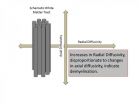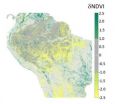(Press-News.org) Treatment of acute traumatic brain injury with the hormone progesterone provides no significant benefit to patients when compared with placebo, a NIH-funded phase III clinical trial has concluded.
The results are scheduled for publication Dec. 10 in the New England Journal of Medicine.
The study, named ProTECT III, involved 49 trauma centers across the United States between July 2009 and November 2013. The study was originally planned to include 1,140 patients, but was stopped after 882 patients because safety monitors determined that additional enrollment would be futile.
Survival and favorable outcomes, measured by improvements in patients' Glasgow Coma Scores, were not significantly different in the progesterone-treated group than in the placebo-treated group. Favorable outcomes occurred in 51 percent of those who received progesterone and 56 percent of those who received placebo. Mortality after six months was 18.8 percent for progesterone and 15.7 percent for placebo.
"These results are plainly disappointing," says David Wright, MD, associate professor and vice chair for research in emergency medicine at Emory University School of Medicine, who served as lead investigator for the national study. "The preclinical data on progesterone's neuroprotective effects are compelling, but we were not able to translate them to a multi-center clinical trial with human traumatic brain injury."
The study was funded by the National Institute of Neurological Disorders and Stroke and organized as part of the NETT (Neurological Emergencies Treatment Trials) network, with the University of Michigan providing oversight and coordination and the Medical University of South Carolina providing data analysis. Michael Frankel, MD, professor of neurology at Emory, was site principal investigator at Grady Memorial Hospital.
Similar results from a separate industry-funded clinical trial of progesterone in traumatic brain injury are scheduled for publication in the same issue of NEJM.
Participating patients were 74 percent male, and the average age was 35. The results were not significantly different in men versus women, or in Caucasians, African Americans or Latinos. The most common mechanism of injury was motor vehicle accident.
Progesterone, administered by infusion for four days, was generally well tolerated, with similar rates of adverse events in both progesterone- and placebo-treated groups. Phlebitis (inflammation of a vein) was more common in the progesterone group.
The rationale for testing progesterone grew out of the observation that women tend to respond to treatment and recover better than men after traumatic brain injury. Both men and women naturally produce progesterone, a steroid hormone important for brain development as well as reproductive functions.
Many research teams, including those at Emory led by Don Stein, PhD, have found in animal experiments that progesterone can protect brain cells from the toxic environment that emerges after traumatic injury. Two smaller clinical trials of progesterone in traumatic brain injury also gave encouraging results.
"The trial results were not what we had hoped. Scientists must now redouble their efforts to develop treatments that protect the brain and enhance its natural recovery mechanisms," says Walter Koroshetz, MD, acting director of the National Institute of Neurological Disorders and Stroke. "Most importantly we need to aggressively pursue whether or not the drugs showing promise in animal studies indeed achieve the desired biologic effect in people before moving to late stage trials. Without such indicators we never learn whether we chose the right dose, duration or even the right drug."
Part of the difficulty in translating drugs with solid preclinical efficacy to the clinic may come from the variability in injury from any given traumatic event, Wright says. The location and extent of injuries to the brain, time elapsed before reaching the hospital, doctors' management and the patient's underlying health and resilience may all affect outcomes and obscure the effects of a proposed neuroprotective agent.
"There are several other examples of drugs that show large disparities between preclinical data and clinical efficacy in both stroke and brain injury, and together these results may push investigators in this field to re-examine how experimental therapies are evaluated," he says.
Wright is part of a UCSF-led project supported by the Department of Defense, called the TBI Endpoints Development Award, which is working to develop better methods for selecting patients for clinical trials and measuring patient outcomes.
In the ProTECT III study, patients' functional recovery was measured by looking for improvements in their Glasgow Coma Scores, an assessment of the severity of brain injury ranging from 3 (deep unconsciousness) to 15 (awake and alert). It includes three components: patients' eyes, their ability to speak and their motor responses. Those with less severe initial injuries needed to have a better recovery than those with more severe injuries to achieve a favorable outcome.
Because of a limited time frame (within four hours) for administering progesterone after brain injury, this study was conducted under exception from informed consent (EFIC), following Food and Drug Administration regulations. EFIC is allowed only when testing treatments for life-threatening conditions and when consent from the patient is not possible and treatment efficacy is thought to depend on being administered quickly.
When legally authorized representatives were available, written informed consent was obtained prior to enrollment. For patients enrolled under EFIC, they or their representatives were notified of enrollment as soon as possible and asked for written consent to continue in the study.
INFORMATION:
A study concluded that after five days of treatment with a novel formulation of progesterone acutely administered to patients with severe traumatic brain injury (TBI), showed no clinical benefits.
The paper entitled, "A Clinical Trial of Progesterone for Severe Traumatic Brain Injury," will be published online in The New England Journal of Medicine, December 10, 2014.
This trial, referred to as SyNAPSe, reports on a large prospective randomized clinical trial that investigated the effects of progesterone administered to severe TBI patients," said Raj K. Narayan, ...
A new study out today in the journal Neurology shows that pregabalin is not effective in controlling the pain associated with lumbar spinal stenosis, the most common type of chronic lower back pain in older adults.
"Chronic low back pain is one of the most common reasons why older adults go to the doctor and lumbar stenosis is the leading indication for surgery in this age group," said John Markman, M.D., director of the Translational Pain Research Program in the University of Rochester Department of Neurosurgery and lead author of the study. "While physicians have ...
Eczema, an itchy chronic inflammatory disease of the skin, was not associated overall with short stature in an analysis of data from several studies, although a small group of children and adolescents with severe eczema who do not get enough sleep may have potentially reversible growth impairment, according to a study published online by JAMA Dermatology.
Eczema (atopic dermatitis) affects about 10 percent of children and adults in the United States. The disease results in a number of conditions that could impact growth in children and adolescents, such as sleep impairment, ...
Surgery to remove all or part of the pancreas and then transplant a patient's own insulin-producing islet cells appears to be a safe and effective final measure to alleviate pain from severe chronic pancreatitis and to help prevent surgically induced diabetes, according to a report published online by JAMA Surgery.
Chronic pancreatitis (CP) is an inflammatory disease that over time leads to loss of function of the pancreas and manifests with intractable pain, malabsorption and diabetes. While medical management and pain control are the initial approaches to CP, some patients ...
MINNEAPOLIS - People who have sleep apnea or spend less time in deep sleep may be more likely to have changes in the brain that are associated with dementia, according to a new study published in the December 10, 2014, online issue of Neurology®, the medical journal of the American Academy of Neurology.
The study found that people who don't have as much oxygen in their blood during sleep, which occurs with sleep apnea and conditions such as emphysema, are more likely to have tiny abnormalities in brain tissue, called micro infarcts, than people with higher levels ...
A team of researchers from the Cockrell School of Engineering at The University of Texas at Austin and environmental testing firm URS reports that a small subset of natural gas wells are responsible for the majority of methane emissions from two major sources -- liquid unloadings and pneumatic controller equipment -- at natural gas production sites.
With natural gas production in the United States expected to continue to increase during the next few decades, there is a need for a better understanding of methane emissions during natural gas production. The study team ...
An interdisciplinary team of neuroscientists and neurosurgeons from the University of Rochester has used a new imaging technique to show how the human brain heals itself in just a few weeks following surgical removal of a brain tumor.
In a study featured on the cover of the current issue of the journal Science Translational Medicine, the team found that recovery of vision in patients with pituitary tumors is predicted by the integrity of myelin--the insulation that wraps around connections between neurons--in the optic nerves.
"Before the study, we weren't able to ...
Researchers have long debated how and what our ancestors ate. Charles Darwin hypothesized that the hunting of game animals was a defining feature of early hominids, one that was linked with both upright walking and advanced tool use and that isolated these species from their closest relatives (such as ancestors of chimpanzees); modified versions of this hypothesis exist to this day. Other scholars insist that while our ancestors' diets did include meat, it was predominantly scavenged and not hunted. Still others argue that particular plant foods such as roots and tubers ...
NEW YORK, NY (December 10, 2014)--Columbia University Medical Center researchers have devised a way to replace the knee's protective lining, called the meniscus, using a personalized 3D-printed implant, or scaffold, infused with human growth factors that prompt the body to regenerate the lining on its own. The therapy, successfully tested in sheep, could provide the first effective and long-lasting repair of damaged menisci, which occur in millions of Americans each year and can lead to debilitating arthritis. The paper was published today in the online edition of Science ...
A 13-year decline in vegetation in the eastern and southeastern Amazon has been linked to a decade-long rainfall decline in the region, a new NASA-funded study finds.
With global climate models projecting further drying over the Amazon in the future, the potential loss of vegetation and the associated loss of carbon storage may speed up global climate change.
The study was based on a new way to measure the "greenness" of plants and trees using satellites. While one NASA satellite measured up to 25 percent decline in rainfall across two thirds of the Amazon from 2000 ...

